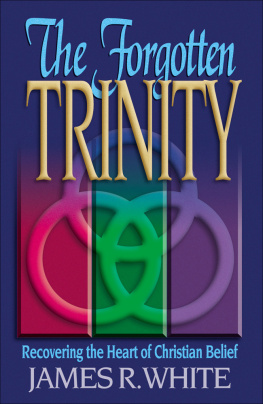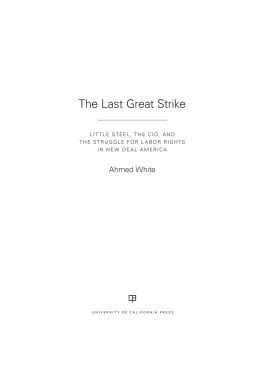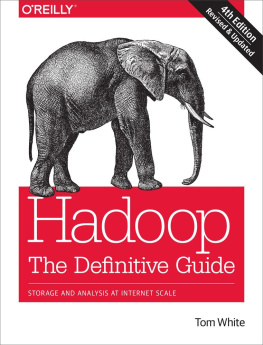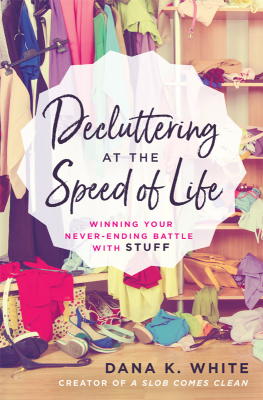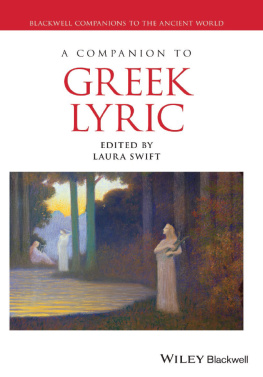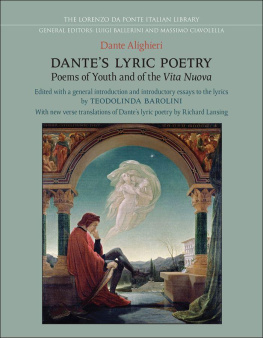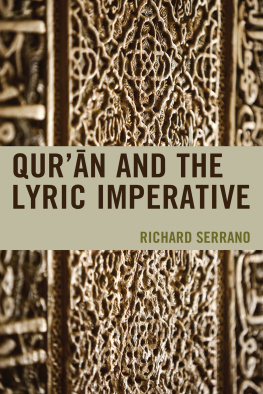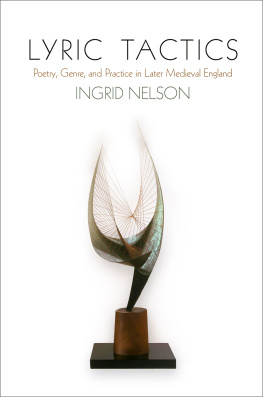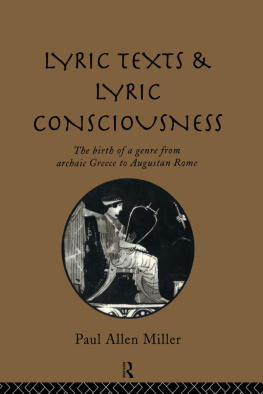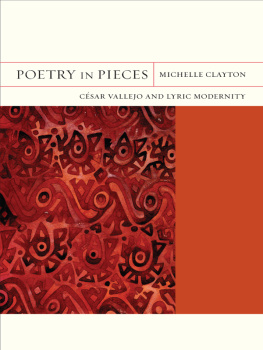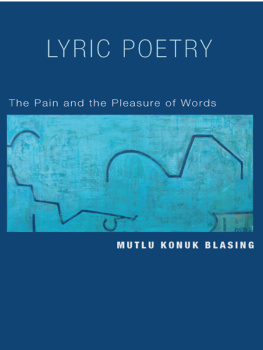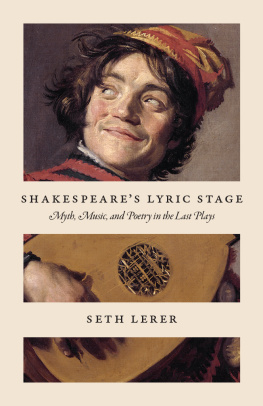White - Lyric shame: the Lyric subject of contemporary american poetry
Here you can read online White - Lyric shame: the Lyric subject of contemporary american poetry full text of the book (entire story) in english for free. Download pdf and epub, get meaning, cover and reviews about this ebook. City: Cambridge;Mass, year: 2014, publisher: Harvard University Press, genre: Art. Description of the work, (preface) as well as reviews are available. Best literature library LitArk.com created for fans of good reading and offers a wide selection of genres:
Romance novel
Science fiction
Adventure
Detective
Science
History
Home and family
Prose
Art
Politics
Computer
Non-fiction
Religion
Business
Children
Humor
Choose a favorite category and find really read worthwhile books. Enjoy immersion in the world of imagination, feel the emotions of the characters or learn something new for yourself, make an fascinating discovery.

Lyric shame: the Lyric subject of contemporary american poetry: summary, description and annotation
We offer to read an annotation, description, summary or preface (depends on what the author of the book "Lyric shame: the Lyric subject of contemporary american poetry" wrote himself). If you haven't found the necessary information about the book — write in the comments, we will try to find it.
Lyric shame: the Lyric subject of contemporary american poetry — read online for free the complete book (whole text) full work
Below is the text of the book, divided by pages. System saving the place of the last page read, allows you to conveniently read the book "Lyric shame: the Lyric subject of contemporary american poetry" online for free, without having to search again every time where you left off. Put a bookmark, and you can go to the page where you finished reading at any time.
Font size:
Interval:
Bookmark:
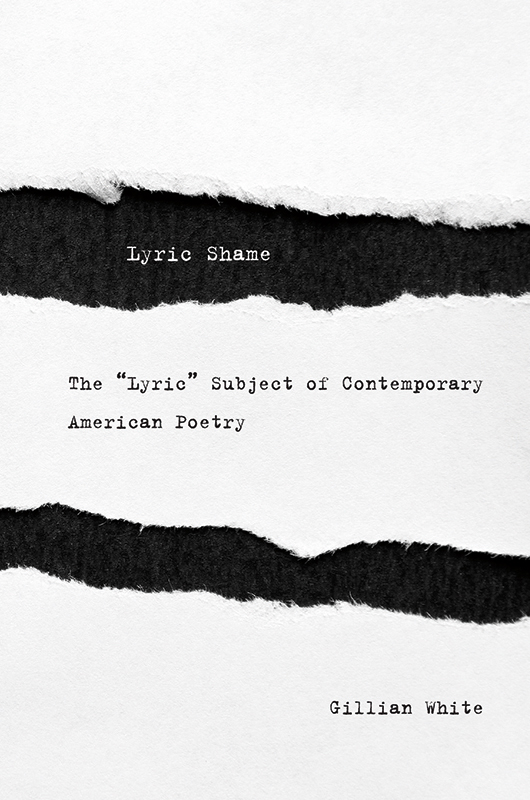

Cambridge, Massachusetts
London, England
2014
Copyright 2014 by the President and Fellows of Harvard College
ALL RIGHTS RESERVED
Cover art: Courtesy Thinkstock
Cover design: Graciela Galup
The Library of Congress has cataloged the printed edition as follows:
White, Gillian C., 1968
Lyric shame : the lyric subject of contemporary American poetry / Gillian White.
pages cm
Includes bibliographical references and index.
ISBN 978-0-674-73439-5 (alk. paper)
1. American poetry20th centuryHistory and criticismTheory, etc. 2. American poetry21st centuryHistory and criticismTheory, etc. 3. Emotions in literature I. Title.
PS325.W47 2014
811'.5409dc23
2014004433
FOR MY FAMILY
- 1
- 2
- 3
- 4
His owners voice arises, stern,
You ought to be ashamed!
What has he done?
He bounces cheerfully up and down;
he rushes in circles in the fallen leaves.
Obviously, he has no sense of shame.
Elizabeth Bishop, Five Flights Up
ELIZABETH BISHOPS 1974 poem Five Flights Up describes a dog owners anthropomorphizing attempt to shame his pet. The owners statement You ought to be ashamed! works two waysa speech act intended to produce the dogs shame, it also, paradoxically, would like to claim that that shame already should have originated with the dog. Shame involves thinking about what others think of you and, as the poem wryly suggests, knowing that you are a you. The joke, that is, is that obviously the dog has no sense of shame, or, anyway, it would be difficult to verify whether it has the complex self-awareness that could help us decide whether it is shameless or not. It becomes more and more difficult to decide whose shame is whose here. The line What has he done?its pronoun hovering, undecided, over both dog and ownermakes it possible that the shame that the owner expects and projects onto his dogs submissive behaviors might in fact be his own.
Bishops lines emphasize shame as an importantly mobile, intersubjective emotion, evident in the strange grammar it requires. Eve Kosofsky Sedgwick calls it a transformational grammar, for the absence of an explicit verb from Shame on you records the place in which an I, in conferring
The understanding of shame as a free radical that institutes changes in meaning has profound implications for a variety of interpretive situations: I am interested in the role of shame not only in instituting interpretive strategies toward self and others but also in institutions of literary interpretation. What if we interpret the dog that has no sense of shame, as he rushes in circles in the fallen leaves, as a figure for what poems do in the current literary culture, circling about amid the question of shame? How does our reading of this poem (indeed, of postWorld War II American poetry) produce a sense of shame, especially if the owners voice arises (and here, we may read owner to include critics or the dominant interpretive culture) to call it a lyric poem, to make its I a lyric I?
This book revolves around a sense of shame involved in twentieth-century lyric reading, producing and describing what I call lyric shame. Cleanth Brooks and Robert Penn Warrens Understanding Poetry (1938), widely distributed as a teaching tool that dominated poetic pedagogy for the next twenty-five years, also assumes natural connections between poetry, interpretive mastery, formal control, and a cure for existential dread, a cluster that has come to define both the ideal and anti-ideal of lyric in the twentieth and early twenty-first centuries. They write,
For in so far as [the reader] appreciates the poem he has a sense of the conquest over the disorder and meaninglessness of experience. Perhaps this sense may be the very basis for his exhilaration in the poemjust as it may be the basis for the pleasure one takes in watching the clean drive of the expert golfer or the swoop of a bird in the air, as contrasted with the accidental tumbling of a stone down a hillside. It is this same sense of order and control given by a successful poem that confirms us in the faith that the experiences of life itself may have meaning.Brooks and Warren do not use the word lyric here, but as Steve Newman has argued, the Brooks/Warren close readings of even ballads in the opening section of Understanding Poetry seek to show a dramatic structure they assumed was inherent to all poems, illustrating an interpretive mode that draws its premises from nineteenth-century lyric theory. Indeed, one could say, with Newman, that Brooks and Warrens readings of ballads, as of all poems, were instrumental to the making of an American lyric subject.
Even if one only dimly senses the values and politics that attach to the ideal of lyric that Brooks and Warren espoused (one so successful that it determines how most poetry is read in universities today), one might have encountered the ambient shame of lyric among academic readers and writers in the United States, especially as it attends the writing and reading of first-person lyric, the Confessional, and personal poems.
Queyrass ambivalent call for a new lyric depends on a host of assumptions about a coherent old lyric that have been powerful in determining the discourses of contemporary poetry in North America and that Lyric Shame will historicize and question. The broadest aim of this book is to explore the sources, dynamics, and consequences of that ambience of lyric shame, then, especially as it circles about and gets projected onto the work, critical reception, and reputations of three twentieth-century American poets: Elizabeth Bishop, Anne Sexton, and Bernadette Mayer. Each of these authors writing has been identified, by different audiences and in different spirits, with the expressive lyric (including that speaking subject to which Queyras refers). And given that expressive lyric is the chief abjection of a powerful and increasingly canonical avant-garde antilyricism now forty years in the making, it is an identification that opens these poets work to shame. But thinking again of Bishops little dog, whose shame is it?
Though poems obviously do not have selves, it is fair to say that in our tendency to anthropomorphize them (as happens if we think about their speakers or their voice or if we deem their supposed confessions shamefully narcissistic), they become subject to shame that is not, so to speak, theirs. The lyric shame of my title, that is, does not refer to expressions of shame in lyric or even shame about lyric. One of the broad premises of this book is that expressive lyric is an abstraction that gets projected onto some writing. More locally, my concern is the projection of expressive lyric onto some midcentury American work to produce its subjective voice. Such abstractions and projections can sometimes enable a positive identification, as when Helen Vendler imagines Robert Lowell to have been jealous of Elizabeth Bishops lyric transparency. In the current academic climate, however, aspects of Bishops identification with lyric, for one example of a broader trend, portray her as minor and conservativearticulating a form of public shaming. The lyric shame I wish to expose and explore here is that of poetry idealized as lyric, or the lyric shamedshame attributed to, projected onto, and produced by readings that anthropomorphize poems as lyric.
Font size:
Interval:
Bookmark:
Similar books «Lyric shame: the Lyric subject of contemporary american poetry»
Look at similar books to Lyric shame: the Lyric subject of contemporary american poetry. We have selected literature similar in name and meaning in the hope of providing readers with more options to find new, interesting, not yet read works.
Discussion, reviews of the book Lyric shame: the Lyric subject of contemporary american poetry and just readers' own opinions. Leave your comments, write what you think about the work, its meaning or the main characters. Specify what exactly you liked and what you didn't like, and why you think so.


